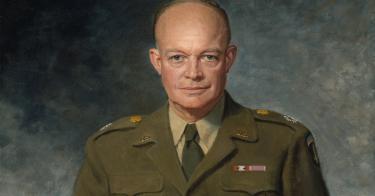May 15, 2018 CANCELLED: The Age of Eisenhower: America and the World in the 1950s
In a 2017 survey, presidential historians ranked Dwight D. Eisenhower fifth on the list of great presidents, behind the perennial top four: Lincoln, Washington, Franklin D. Roosevelt, and Teddy Roosevelt. Historian William Hitchcock shows that this high ranking is justified.

Tuesday, May 15, 2018
10:00 a.m. - 11:00 a.m.
The Heritage Foundation
Lehrman Auditorium
Featured Author
William Hitchcock
Hosted by
Description
In a 2017 survey, presidential historians ranked Dwight D. Eisenhower fifth on the list of great presidents, behind the perennial top four: Lincoln, Washington, Franklin D. Roosevelt, and Teddy Roosevelt. Historian William Hitchcock shows that this high ranking is justified. Eisenhower’s accomplishments were enormous and loom ever larger from the vantage point of our own times.
Ike kept the peace: he ended the Korean War, avoided a war in Vietnam, managed a potential confrontation with China, and soothed relations with the Soviet Union after Stalin’s death. He guided the Republican Party to embrace central aspects of the New Deal like Social Security. He thwarted the demagoguery of McCarthy and advanced the agenda of civil rights for African Americans. As part of his strategy to wage, and win, the Cold War, Eisenhower expanded American military power, built a fearsome nuclear arsenal and launched the space race. In his famous Farewell Address, he acknowledged that Americans needed such weapons in order to keep global peace – but he also admonished his citizens to remain alert to the potentially harmful influence of the “military-industrial complex.” Hitchcock shows how Ike shaped modern America. He also assesses Eisenhower’s close confidants, from Attorney General Brownell to Secretary of State Dulles. The resulting reevaluation explains why this “do-nothing” president is rightly regarded as one of our best leaders.
Visit www.AgeofEisenhower.com for further details.
